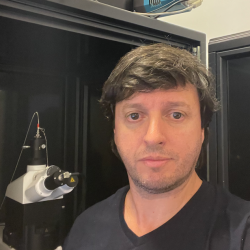
Faccio Sgiorovello, Ricardo Juan
Researcher graduateResearch interests
1. Carbon Nanomaterials:Investigation of defects and dopants in carbon-based nanomaterials (e.g., graphene, graphene nanoribbons, nanotubes, and fullerenes).
Study of electronic properties such as magnetism, electronic transport, and optical characteristics.
Exploration of Molecular Electronics through theoretical simulations in collaboration with experimental groups, including international partners.
2. Nanomaterials for Energy Applications:
TiO₂ Nanostructures for Solar Cells: Development and optimization of TiO₂-based nanostructures to enhance the efficiency of solar cells.
Lithium-ion Battery Materials: Design and synthesis of nanomaterials, specifically nanoparticles based on LiFePO₄, for energy storage applications.
Solid Electrolytes and Titanates: Preparation and modeling of materials for energy storage, focused on lithium-ion battery components.
3. Advanced Characterization Techniques and Infrastructure Development:
Acquisition and use of high-precision equipment, such as the Raman-AFM microscope, for advanced material characterization.
Development of methodologies for characterizing microplastics, contributing to environmental research.
Working area
The research activity focuses on Materials Science, specifically in the field of Nanotechnology, combining theoretical and experimental approaches. The main research lines are centered on the study of carbon nanomaterials and nanomaterials for energy applications.Regarding carbon nanomaterials, the research is aimed at understanding the role of defects and dopants in materials such as graphene, graphene nanoribbons, nanotubes, and fullerenes, with particular emphasis on their electronic properties, including magnetism, electronic transport, and optical characteristics. These studies are conducted in collaboration with both regional and international research groups, enabling forays into the field of Molecular Electronics. Through theoretical simulations, experimental groups in Germany and Brazil have been supported, yielding prominent results, such as a publication in *Nature: Sci. Rep.* (2015).
In the energy sector, the research focuses on TiO₂ nanostructures for solar cell applications and the development of nanomaterials for energy storage in lithium-ion batteries. This work has been supported by two ANII-FSE projects and has included the preparation and modeling of materials for solid electrolytes and titanates. Recently, progress has been made in synthesizing nanoparticles for lithium-ion battery cathodes based on LiFePO₄, leading to the first publications in this field in the country. This research has justified the acquisition of the country's first Confocal Raman-AFM Microscope, funded by ANII (EQC and FSE). Additionally, in 2019, CSIC provided funding for the purchase of a powder diffractometer, and in 2024, an upgrade to the Raman microscope was secured, enabling the analysis and characterization of microplastics, thus contributing to environmental research in Uruguay.
The development of material and human capacities has been a central focus, promoting the creation of undergraduate, graduate, and specialization courses to disseminate available techniques and equipment, integrating them into other research areas. Examples include the co-supervision of two postgraduate theses in Chemistry, one with the Pharmacology group at FQ (recognized with the 2023 Chemical Sciences Award) and another with the Microbiology group at FQ, addressing the physicochemical characterization of drug formulations and interaction with metallic nanoparticles, respectively.
There is also a strong commitment to human resource training. In this regard, 2 PhD theses in Chemistry, 2 postdoctoral projects, and three Bachelor’s theses in Chemistry have been supervised locally. Currently, 6 PhD theses in Chemistry (all resulting from postgraduate projects), 2 PhD theses in Physics (one in Uruguay and one in Argentina), and 2 postdoctoral projects in Argentina are under supervision, all related to the design, characterization, and simulation of materials for energy applications.
In total, 11 postgraduate theses have been supervised, focusing on Chemistry and Physics at both local and international levels. At the Faculty of Chemistry of the University of the Republic (UdelaR) and in the Basic Sciences Development Program (PEDECIBA), 8 PhD theses in Chemistry and Physics have been completed, while internationally, 3 PhD theses have been supervised at the National University of the South, Argentina.
This work has resulted in the publication of 223 articles, numerous conference presentations, and 46 invited oral presentations over time.
Personal information
Email: rfaccio@fq.edu.uyORCID: 0000-0003-1650-7677
SCOPUS: 6701745624
CVUy: see
Institution: Facultad de Química - Udelar
Career at PEDECIBA
Chemistry Area
As researcher
| Motive | Start date | Minutes | |
|---|---|---|---|
| Investigador - Evaluación | Grado 5 | 01/10/2025 | View minutes |
| Investigador - Cambio de grado (evaluación) | Grado 5 | 18/11/2020 | View minutes |
| Investigador - Evaluación | Grado 4 | 18/11/2020 | View minutes |
| Investigador - Cambio de grado (evaluación) | Grado 4 | 11/02/2015 | View minutes |
| Investigador - Evaluación | Grado 3 | 06/05/2010 | View minutes |
| Investigador - Ingreso | Grado 3 | 28/02/2008 | View minutes |
As student
| Motive | Education level | Start date | Minutes |
|---|---|---|---|
| Estudiante - Egreso | Doctorado | 22/11/2007 | View minutes |
| Estudiante - Ingreso | Doctorado | 14/10/2004 | View minutes |